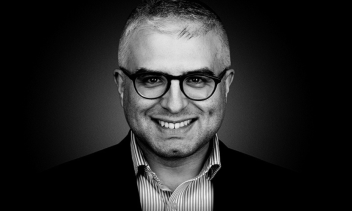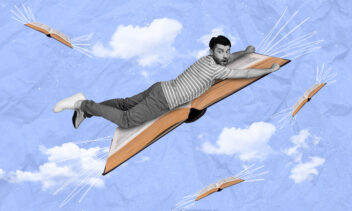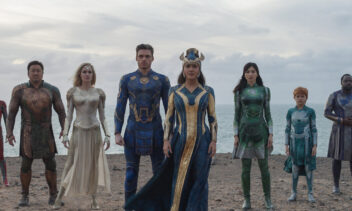This week, we present a list of fiction books that we hope to read deeply this summer. We have suggestions from David Hopen, the author of the powerful new novel The Orchard, and our recent guest, along with suggestions from our host David Bashevkin, some of the members of our august student board, and myself, the writer of these weekend readers, Yehuda. But first, an introduction!
George Steiner, a highly idiosyncratic literary critic and philosopher, spent a lifetime thinking seriously about language, letters, and reading, and is therefore well-credentialed to give us this beautiful characterization of the literary tendency of humanity:
In short, the least inadequate definition we can arrive at of the genus homo, the definition that fully distinguishes him from all neighboring life-forms, is this: man is a zoon phonanta, a language-animal. And there is no other like him.
Man is a “zoon phonanta, a language-animal.” I can’t be sure to know exactly what those words mean, and I’m slightly too lazy to look it up, but they do feel nice rolling off the tongue, and they give us a sense for the special relationship that we have with the words we use.
While less phonetically euphonic, more striking are his words on reading, and the radical engagement with the most real parts of our selves that reading well offers. He says that:
To read well is to take great risks. It is to make vulnerable our identity, our self-possession. In the early stages of epilepsy there occurs a characteristic dream (Dostoevsky tells of it). One is somehow lifted free of one’s own body; looking back, one sees oneself and feels a sudden, maddening fear another presence is entering into one’s own person, and there is no avenue of return. Feeling this fear, the mind gropes to a sharp awakening. So it should be when we take in hand a major work of literature or philosophy, of imagination or doctrine. It may come to possess us so completely that we go, for a spell, in fear of ourselves and in imperfect recognition. He who has read Kafka’s Metamorphosis and can look into his mirror unflinching may technically be able to read print, but is illiterate in the only sense that matters.
I have thought back to this last line again and again in my life in reading: “He who has read Kafka’s Metamorphosis and can look into his mirror unflinching may technically be able to read print, but is illiterate in the only sense that matters.” This is a statement to aspire to, even if it is not one easily accessible to even the most emotionally attuned of readers. I aspire to read in a way that takes great risks. Steiner continues:
When he was twenty, Kafka wrote in a letter: ‘If the book we are reading does not wake us, as with a fist hammering on our skull, why then do we read it? So that it shall make us happy? Good God, we would also be happy if we had no books, and such books as make us happy we could, if need be, write ourselves. But what we must have are those books which come upon us like ill-fortune, and distress us deeply, like the death of one we love better than ourselves, like suicide. A book must be an ice-axe to break the sea frozen inside us.’ Students of English literature, of any literature, must ask those who teach them, as they must ask themselves, whether they know, and not in their minds alone, what Kafka meant.
Do we know what these words mean? As serious readers, learners, (pray-ers?) of the text, Jews engage with these truths deeper than most, and yet it is too easy to leave that serious engagement with text in the beit midrash, and not when we read novels, newspapers, and Twitter. To be a great reader, to read with risk, we hope to bring our deep attunement, emotional and intellectual, to all the texts that we choose to we read.
In honor of this timeless hope, we present some of the fiction books that we hope to read deeply this summer. Let us know which you like, love, or couldn’t get through!
The Books We’re Reading:
- David Hopen: Religion’s Role in the Messiness of Life
For his recommendations, David, a first-time novelist and law student, recommends books that he found can “stretch your mind,” books that helped him explore the role that religion, and religious community, can play in dealing with the messiness of life. The first, like The Orchard, is a coming-of-age novel about a group of intellectually curious young people discovering their world, and the others are similarly engaged with understanding culture and religion through the literary lens. Check them out, and let us know what you think.



The Secret History by Donna Tartt
Here I am by Jonathan Safran Foer
On Beauty by Zadie Smith
- David Bashevkin: Contending with Ourselves
For his recommendations, David focused on books that showcase how “Jews contend with differences and commonality among themselves, and also against the broader world, and also in previous generations.” Each book has its own story, which David walks through in his conversation with David (listen here to hear what he has to say!). The first, written under a pseudonym by a member of a rabbinic family, is about a yeshiva student who falls in love with a non-Jewish woman, and it contends with the tension between the world of the cloistered yeshiva and the larger world. The second is the script of a play that deals with the tensions between generations of Jews trying to come to terms with their identity, and the third is a powerful fiction article by Nathan Englander. Read ‘em, and let us know what you think.
With All My Heart, With All My Soul by B. D. Da’Ehu
Bad Jews by Joshua Harmon
What We Talk About When We Talk About Anne Frank by Nathan Englander
- Student Board:
Some of the members of our newly established student board, comprised of college students from across the US, shared some of their favorite fiction reads for our enjoyment. Miri Miller recommends People of the Book, by Geraldine Brooks, which Miri found to have great imagination and storytelling, and that it brought aspects of Jewish history to life in a vivid and creative way. Alex Harris recommends World Cup Wishes and The Hilltop, the latter of which is most definitely on my own to-read list now as well. We hope you enjoy, and let us know what you think.



People of the Book by Geraldine Brooks
World Cup Wishes by Eshkol Nevo
The Hilltop by Assaf Gavron
- Yehuda Fogel: Ideas and Identity
For my recommendations, I chose three books that still echo often in my life: Dara Horn’s The World to Come, Der Nister’s The Family Mashber, and Liharaz Tuitto-Froman’s Shmonah Dakot Ohr. Each book enters the overlapping worlds of Jewish ideas and Jewish identity, powerfully offering a window into an aspect of religious life you may never have appreciated. The first two books make for interesting companions, as Der Nister plays a role in Dara Horn’s The World to Come, in her touching book that plays with ideas about the world that is, was, and will be. Shmonah Dakot Ohr, or eight moments of light, is not yet available in English, and in America, but I include it because it deserves to be included. Written by the daughter of Rav Menachem Froman, this intriguing novel portrays a fictionalized version of the author’s family as they journey towards the life of a tzaddik after the loss of their husband and father, Rav Froman. If that doesn’t make sense to you, check out the book and come back to me—its worth the read.



The World to Come by Dara Horn
The Family Mashber by Der Nister
Shmonah Dakot Ohr by Liharaz Tuitto-Froman (Hebrew)










